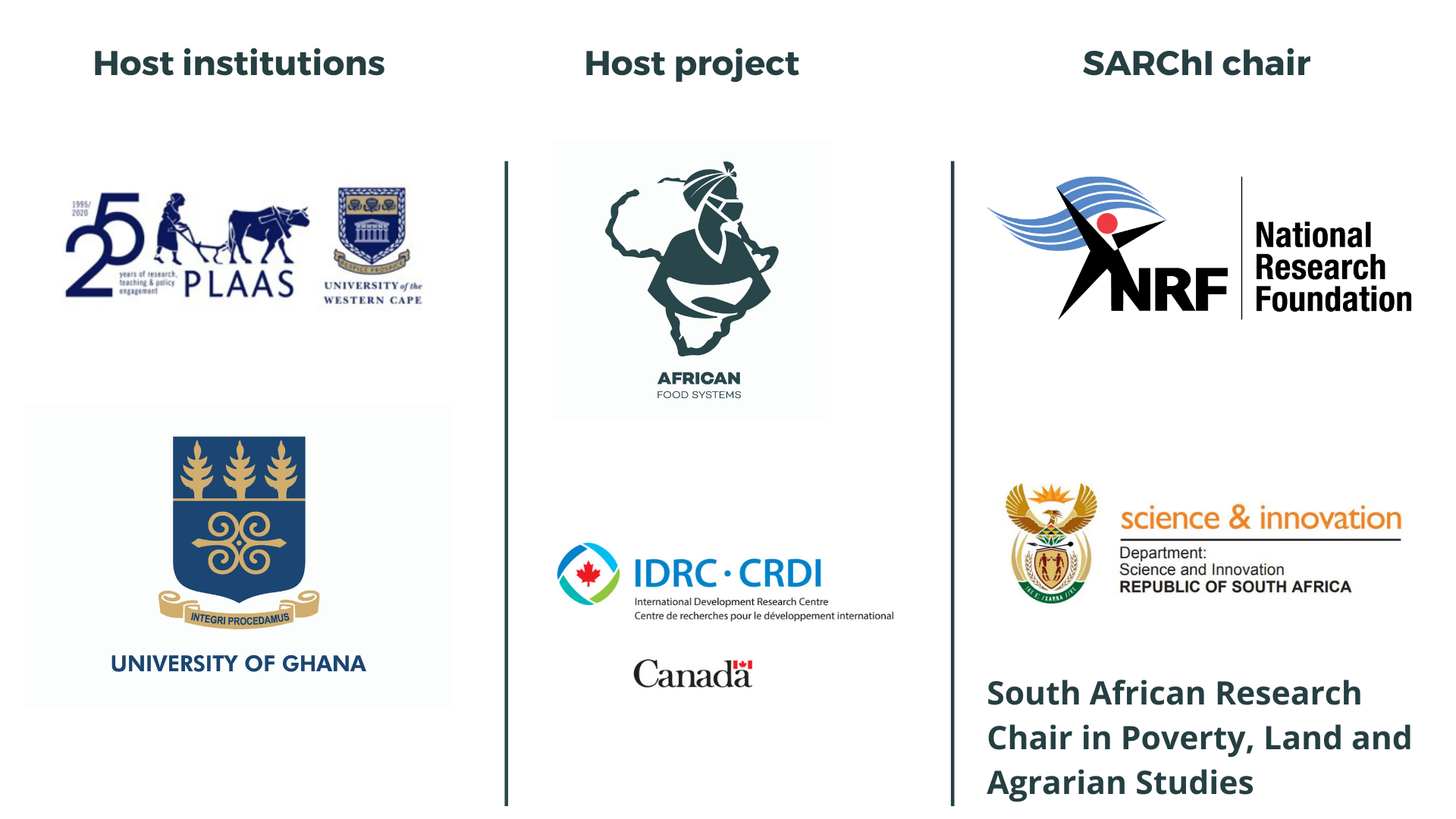INVITATION: What is the place of production in social reproduction theory?
TUESDAY 14th September 2021 from 13:00 SAST/CAT
The University of the Western Cape’s Institute for Poverty, Land and Agrarian Studies (PLAAS) in partnership with the University of Ghana invites you to an online seminar: “What is the place of production in social reproduction theory?”
The speakers include:
- Professor Ben Cousins, Emeritus Professor, PLAAS
- Professor Akosua Darkwah, Associate Professor, University of Ghana
Student panel include:
- Constance Mogale, MPhil on social reproduction and land rentals at Marikana, North West
- Ashley Fischhoff, MPhil on space, organisation and social reproduction at Enkanini, Western Cape
- Ndu Majozi, PhD on socio-spatial dynamics in a land occupation a eKhenana, KwaZulu-Natal
- Laurel Oettle, MPhil on COVID-19 and women in the informal food system in KwaZulu-Natal
The webinar will be chaired by Professor Ruth Hall from the Institute for Poverty, Land and Agrarian Studies (PLAAS) at the University of the Western Cape.
Tune in on Tuesday 14 September 2021 at:
- 13:00 South African Standard Time (SAST)/Central African Time (CAT)
- 12:00 West African Time (WAT)
- 11:00 Greenwich Meridian Time (GMT) (Ghana)
- 14:00 East African Time (EAT) (Tanzania)
Register for the online seminar here: https://uwc.zoom.us/meeting/register/tJwvdOmsqTgsGt0BxoRCWn2j8wmNNrJZfLD9
After registering, you will be sent the Zoom link as well as Ben Cousins’ draft paper. You are requested to read this before the seminar.
Land, social reproduction and agrarian change
Ben Cousins
Abstract
Emerging debates on the character and scope of social reproduction under capitalism resonate strongly with many of the key concerns of critical agrarian studies. This is because land and agriculture continue to be important in the social reproduction strategies of large populations of rural dwellers in the Global South, albeit in highly variable ways and subject to change over time. This paper reviews current debates on social reproduction, and in particular its relationship with capitalist production and class relations. The paper then examines the changing roles of land and agriculture in the dynamics of production and social reproduction in the Global South, drawing on studies from a wide variety of contexts. Key themes include the intertwined but contradictory character of production and reproduction in land-based livelihoods; the role of land in structuring social relations and identities, including gender and generation; the significance of different forms of property rights; and the centrality of social reproduction concerns in contemporary struggles over land and natural resources. It is argued that although the dynamics of social reproduction influence the course of processes of agrarian change, their subordinate role within capitalism means that the dynamics of accumulation are ultimately more important determinants. The chapter concludes with brief reflections on the potential contributions of land-based social reproduction struggles to anti-capitalist politics in the current era.
Social reproduction and food system change in Ghana & South Africa: Women’s time, labour and care work amidst multiple crisis during COVID-19
Akosua Darkwah and Ruth Hall
Abstract
While production and reproduction are intimately linked, this paper draws attention to precisely how women strategise to reconcile the contradictory demands of these spheres and their points of intersection in their lives, in times of crisis. Drawing on recent field research in Ghana and South Africa, we investigate and analyse the impacts of COVID-19 regulations and mitigation measures on the social reproduction of some of the women people who produce and trade our food – and in turn how these changed circumstances curtail their power and participation in the food system. We show how food system governance thinking is blinkered by a productionist focus and that, in responding to COVID-19, governments have attempted to safeguard food production. Putting the work of social reproduction in the centre of the food system, we show how regulations shifted the time, labour and costs involved in social reproduction primarily to women – and how mitigation measures were refracted through gender, class, race and generation. Under the broad heading of social reproduction, we examine the interplay between household composition, paid and unpaid work, migration and remittances, and food procurement, preparation and consumption by women in the food system. In both countries we find that the effects of school closures outweighed most others in terms of constraining women’s abilities to derive livelihoods from the food system. Indirect impacts were magnified for women, as multiple lockdown and other regulatory measures shifted labour burdens – for which the mitigation response failed to compensate. We show the compounding effects and intersections as the outcomes of one intervention shaped the outcomes of others. Building from these empirical insights, we respond to the evolving conversation in social reproduction theory. We note that clarifying the articulation between the spheres of production and reproduction remains in dispute and that theorising the articulation between them should draw from lived experience and struggle, guided by women’s strategies to reconcile and contest such artificial divides.
Programme
Welcome and introduction
Students present prepared questions
Ben Cousins: paper presentation
- Student panel: responses in a rapid-fire round-robin
Akosua Darkwah: paper presentation
- Student panel: responses in a rapid-fire round-robin
Ben and Akosua: responses on strengthening social reproduction theorisation
Open discussion
Student panel: insights, reflections and implications for our research
Closing


